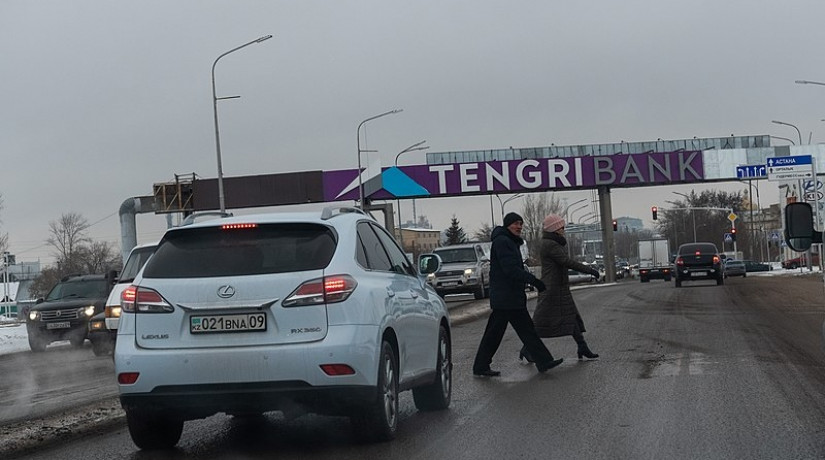Kazakhstan: Government allowing shady banking minnows to wither
 18 Февраля 2021
18 Февраля 2021
 1082
1082
 Экономика
Экономика
 economy,
banks
economy,
banks
 Фото:Eurasianet
Фото:Eurasianet
Almaty. February 18. Information Center - There was a time when Kazakhstan’s authorities pulled out all the stops to keep banks from going under. Those days are in the past. Instead, the government is allowing dubiously administered minnows to wither in the hope that mid-ranking players can grow and restore some health to a chronically trouble-ridden financial sector, Eurasianet reports.
The disintegration of Tengri Bank, a lower-tier lender, came to its conclusion this week as a court order for its operations to be terminated came into force. Two days later, on February 17, media were reporting that the bank’s former chairman, Yerzhan Shaikenov, had been detained in connection with ongoing investigations into the alleged embezzlement of more than 5.4 billion tenge ($12.6 million).
The alarm bells began ringing in September, when the banking regulator stripped Tengri Bank, which was 42 percent controlled by Indian government-owned Punjab National Bank, of its operating license. Nominally, that happened after the bank’s share of non-performing loans came to exceed 80 percent of its overall credit portfolio.
All banks operating in an underperforming economy, like the one Kazakhstan is experiencing now, run the risk of being weighed down by bad loans, but probing by financial regulators revealed a more sinister picture at Tengri Bank.
“Most of the problematic loans were issued, in the period from 2015 to 2017, to persons related to the bank’s Kazakh shareholders and they accounted for 58 percent of the bank's loan portfolio,” they said in their statement.
A massive outflow of deposits had by early 2020 compounded the bank’s liquidity troubles, to the point that it was unable to fulfill basic fiduciary obligations. In March, the regulator demanded that major shareholders recapitalize the bank to tune of around 23 billion tenge (about $53 million at that time), but they failed to abide by that injunction.
In November, two key executives were arrested as part of the investigations that have now also caught up with the ex-chairman, Shaikenov.
Yet another lender, AsiaCredit Bank, lost its operating license on February 12.
The Financial Market Regulation and Development Agency said its decision was based on the bank’s systematic policy of ignoring supervisory measures and failing to comply with demands for additional capitalization.
The volume of the bank's assets are practically equivalent to its outstanding loan portfolio of around 45 billion tenge ($107 million). Of those loans, around 70 percent have been classed as non-performing, meaning they had been overdue for more than three months.
AsiaCredit Bank faces probable liquidation too.
That these banks are allowed to sink marks a change of thinking since the times of President Nursultan Nazarbayev, who grumbled in 2018 that the government had spent more than $9 billion injecting liquidity into stressed banks.
Moody’s Investor Services has offered a positive verdict on the elimination of Tengri Bank and AsiaCredit Bank from the scene, saying it represented a good example of the authorities’ efforts to clean up the banking system. The disappearance of weak banks will create more space for mid-ranking lenders to compete with giants like Halyk Bank, which accounts for 32 percent of the market in terms of assets, Moody’s said.
Kazakhstan’s banking system, as characterized by Moody’s, is concentrated at the top and fragmented at the bottom. The top 10 players have a combined market share of 86 percent. The remaining 16 banks, which include AsiaCredit Bank, contend for the crumbs.
A scythe-wielding banking regulator can go a long way toward boosting competitiveness, but the propensity for shady dealing among many of Kazakhstan’s bankers may be a harder nut to crack.
ru Займы под 120% годовых: дело о незаконном кредитовании передано в
ru Выставка тепличных технологий Grow Expo Astana 2026 пройдет 8-10 апреля
ru Жаркентская мечеть включена в предварительный список Всемирного наследия ЮНЕСКО
ru В Минтруда обсудили новые механизмы трудоустройства лиц с инвалидностью
ru Схема обмана студентов через соцсети раскрыта в Шымкенте
ru В Акорде состоялась церемония встречи Президента Сербии
ru Мобильный ЦОН: сколько услуг казахстанцы получают через приложение
ru Подростки с особыми потребностями осваивают профессию кондитера в Карагандинской области
ru КНБ ликвидировал канал контрабанды наркотиков
ru Охлажденное мясо птицы можно будет хранить в 3 раза дольше
ru Солдат Национальной гвардии разработал цифровой портал для военнослужащих
ru Учащиеся 0-9 классов второй смены переведены на дистанционный формат обучения
ru Пенсионерка едва не лишилась более 2 млн тенге в Павлодаре
ru Строительство нового завода Coca-Cola Içecek в Актобе планируется начать в
ru Один из крупнейших бизнесменов Польши построит фармзавод в Шымкенте
ru Стартует прием заявок на премию Президента Республики Казахстан «Алтын Сапа»
ru Президент Сербии Александр Вучич посетит Астану 26-27 февраля
ru Глава государства направил поздравительную телеграмму Эмиру Кувейта
ru МТСЗН РК опровергло фейк о ежегодном отпуске
ru В Алматы открылась юбилейная выставка о мастерах кино
ru В Астане вынесен приговор интернет-мошеннице
ru Олжас Бектенов о выделении 1 трлн тенге на посевную кампанию
ru Олжас Бектенов поручил упростить и оцифровать процедуру льготного кредитного финансирования
ru В Казахстане продолжается подготовка к паводковому периоду
ru В Алматы продолжают расширять фонд студенческих общежитий
ru Почти 3000 га сельхозземель возвращены в госсобственность в Туркестанской области
ru Марихуана в особо крупном размере изъята в ВКО
ru Олжас Бектенов провел заседание Совета директоров «Самрук-Қазына»
ru Из Турции экстрадирован подозреваемый в серийном мошенничестве
ru Спасатели МЧС оказали помощь 13 гражданам, оказавшимся в снежном заносе

 +77772555856
+77772555856
 Написать нам
Написать нам












